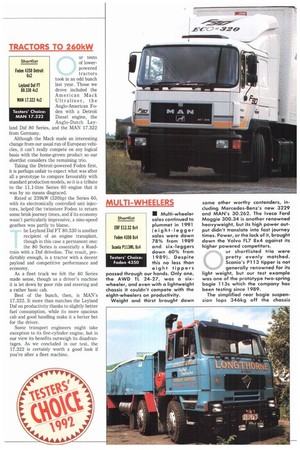C . ur tests -1 1 of lower i t powered
Page 36

If you've noticed an error in this article please click here to report it so we can fix it.
tractors took in an odd bunch last year. Those we drove included the American Mack Ultraliner, the Anglo-American Foden with a Detroit Diesel engine, the Anglo-Dutch Leyland Daf 80 Series, and the MAN 17.322 from Germany.
Although the Mack made an interesting change from our usual run of European vehicles, it can't really compete on any logical basis with the home-grown product so our shortlist considers the remaining trio.
Taking the Detroit-powered Foden first, it is perhaps unfair to expect what was after all a prototype to compare favourably with standard production models, so it is a tribute to the 11.1-litre Series 60 engine that it was by no means disgraced.
Rated at 239kW (320hp) the Series 60, with its electronically controlled unit injectors, helped the twinsteer Foden to return some brisk journey times, and if its economy wasn't particularly impressive, a nine-speed gearbox was partly to blame.
he Leyland Daf FT 80.330 is another recipient of an engine transplant, though in this case a permanent one: the 80 Series is essentially a Road train with a Daf driveline. The result, predictably enough, is a tractor with a decent payload and competitive performance and economy.
As a fleet truck we felt the 80 Series made sense, though as a driver's machine it is let down by poor ride and steering and a rather basic cab.
6x2 Leyland Dal FT 80.330 4x2
MAN 17.322 4x2
Best of the bunch, then, is MAN's 17.322. It more than matches the Leyland Daf on productivity thanks to slightly better fuel consumption, while its more spacious cab and good handling make it a better bet for the driver.
Some transport engineers might take exception to its five-cylinder engine, but in our view its benefits outweigh its disadvantages. As we concluded in our test, the 17.322 is certainly worth a good look if you're after a fleet machine.




















































































